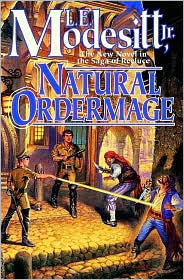 Kéthani
KéthaniBy Eric Brown
(Solaris 2008)
While I'm a fantasy fanboy at heart, I do like to dip now and then into the other speculative genres. Having come across one or two favourable reviews for Eric Brown's Kéthani - and realising that I really ought to read more sci-fi - I thought I'd give it a go.
Now, I'll freely admit that I don't know much about the current state of sci-fi. I'm not really sure what authors are popular, what kind of stories are the 'in' thing, and so on.
What struck me about Kéthani however was that it was remarkable for being a sci-fi novel that was more about mankind than alien life/advanced technology.
The premise is wonderfully simple: the alien race known only as the Kéthani have descended upon earth and offered the gift of eternal life to mankind. The way it works is as follows: a minor operation is carried out on the subject human to insert an 'implant.' In the event of the human's death (whether by natural causes or accident) the implant will be activated and will automatically alert the (human) staff at the nearest 'Onward Station' who will come and collect the body. The 'soul' of the person will then be beamed up to the Kéthani spaceship orbiting the Earth, and in six months the individual will be returned to Earth in full health (and usually a decade or so younger). The individual - or 'returnee' as they're known - then has the choice of staying on earth permanently or voyaging among the stars as an ambassador for the Kéthani, bringing their message of goodwill to the other races of the universe. While what happens to the returnees during their six-month absence is not fully known, it is agreed that all returnees demonstrate more humanity than they did when previously alive. For example, they are often more caring, compassionate and understanding.
Rather than taking a sweeping, global look at the impact of the Kéthani on mankind, Brown instead focuses on a handful of people in Yorkshire. Each chapter focuses on a different character, sometimes narrated in the third person by the primary character Khalid, or in first-person by the character themselves. Interspersed between chapters are interludes - always told from Khalid's perspective - that detail how much time has passed since the coming of the Kéthani and often serve as an introduction to the next character's story.
The small-scale focus works extremely well. What we get - rather than a big diorama - is a stripped-down, personal look at how these peoples' lives have been affected by the Kéthani and their ability to grant immortality. The stories are by turns sad, uplifting and extremely thought-provoking. Brown raises a number of philosophical questions: what role does God play in all this? What are the implications of not having the implant operation? Is the prospect of eternal life really as good as it seems? If you personally are against the implantation process (as many humans are), should you refuse to let your child be implanted? Is life suddenly made worthless by the fact that death is no longer something to be feared?
Subsequently Kéthani is a novel that resonates with real meaning, as each character struggles with their own problems caused by the arrival of the Kéthani, often having to look deep within themselves to find the solution. The decisions they come to are not always what you'd expect.
There are some flaws with the novel. The story does have a slightly disjointed feel to it, the result of many of the chapters originally being written as short stories. There is also a problem with repetition later on (the imagery used to describe the 'Onward Stations' and the scenes set in The Fleece pub are the main offenders here). Furthermore, the stories of some characters are more interesting than others and some of the individuals are not quite as well developed as some of their fellows.
Nonetheless, Kéthani is for the most part an absorbing, thoughtful read that serves as a good reminder why fantasy kids like me should read more sci-fi.
Rating: dddd






















 Sunlit woods.
Sunlit woods.


